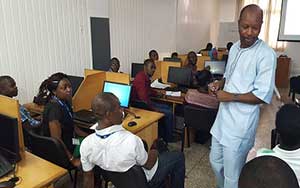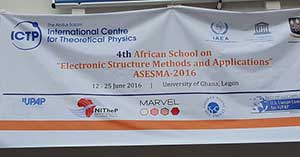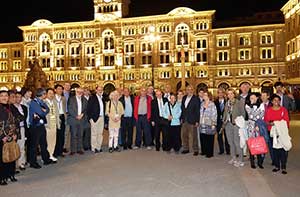The International Union of Pure and Applied Physics
Kennedy Reed
The International Union of Pure and Applied Physics (IUPAP) traces its beginnings to Brussels in 1922. IUPAP was established that year with thirteen countries as founding members. Today there are sixty members. These members are communities of physicists in countries or regions around the world. The mission of IUPAP is to assist in the worldwide development of physics; to foster international cooperation in physics; and to help in the application of physics toward solving problems of concern to humanity.
IUPAP is governed by its General Assembly, which meets every three years and brings together delegates from all of the member countries or regions. The General Assembly elects an Executive Council, which oversees and administers IUPAP’s activities between the General Assembly meetings.
IUPAP currently has nineteen specialized international commissions. Seventeen of these cover particular subfields of physics (eg. Nuclear Physics, Atomic, Molecular and Optical Physics, Plasma Physics, Astrophysics,… etc.) These commissions promote international cooperation in their particular subfields. Every year IUPAP sponsors 20 to 30 international conferences, and each of the specialized commissions recommends international conferences in its particular subfield for IUPAP sponsorship or endorsement. The commissions also grant awards or prizes to recognize physicists who make outstanding contributions to the particular subfields of physics covered by the commission. Of particular importance are the Young Scientists Prizes that commissions grant to recognize and encourage early career scientists who have carried out especially noteworthy research in their subfield during a period within eight years of completing their Ph.D. The recipients of these Young Scientists Prizes are prominently featured on the IUPAP website and in the IUPAP newsletters.
The Commission on Physics for Development works to help improve conditions for physics and physicists in developing regions of the world. This commission proposes and supports initiatives that contribute to development, and makes recommendations regarding IUPAP support for international conferences and workshops in developing countries. The African School Series on Electronic Structure Methods and Applications (ASESMA) is a noteworthy example of this commission’s work. ASESMA was initiated as a joint effort of the Commission on Physics for Development and the Commission on Computational Physics, and in partnership with the International Center for Theoretical Physics (ICTP) in Trieste, Italy. This series of schools on computational materials science is planned on a biennial basis, and focuses on theory and computational methods for predicting and understanding materials through calculations at the fundamental level of electronic structure. Particular emphasis is placed on applications relevant to developing countries in Africa. The fourth school in this series took place June 12 -22, 2016 at the University of Ghana. Previous schools were in Cape Town, South Africa (2010), Eldoret, Kenya (2012), and Johannesburg (2015).
The efforts of this commission also recently led to the establishment of the IUPAP Medal for Outstanding Contributions to the Enhancement of Physics in Developing Countries, It is expected that the first of these medals will be awarded at the next General Assembly.
The Commission on Physics Education works on collection, evaluation and distribution of information on education in the physical sciences among members of the international scientific community. This commission helps physics teachers in all countries and at all levels to incorporate current knowledge of physics, physics pedagogy, and the results of research in physics education in their courses and curricula.
There are also Affiliated Commissions, which are groups of scientists recognized by the General Assembly, but appointed by other scientific bodies. The four current affiliated commissions are: AC1-International Commissions for Optics (ICO); AC2-International Commission on General Relativity and Gravitation; AC3-International Commission for Acoustics; and AC4 -International Commissions on Medical Physics.

Lecture in 2016 ASESMA at University of Ghana. June 2016

Banner for ASESMA 2016 in Ghana

IUPAP Council and Commission Chairs meeting in Trieste, Italy. April 2015.
The work of IUPAP is also carried out in Working Groups, which focus on topics that need international and interdisciplinary cooperation and can potentially lead to the development of new fields of research.
Working groups are generally of limited duration, and new working groups are appointed as warranted by emerging needs in the scientific community. Working groups sometimes can lead to the formation of new IUPAP commissions. In March of 2016, IUPAP announced the formation of a new Working Group on Accelerator Science.
While the specialized international commissions cover a broad range of subfields of physics, IUPAP also maintains close liaison with several other international scientific bodies to cover interdisciplinary activities. In particular, IUPAP is a member of the International Council for Science (ICSU), and appoints representatives to ICSU and some of ICSU’s other members and committees. Examples of such committees are the Committee on Data for Science and Technology (CODATA), the Committee on Space Research (COSPAR), the Scientific Committee on problems of the Environment (SCOPE), and the Consultative Committee on Units (CCU).
IUPAP has a role in the verification and naming of new elements. IUPAP and the International Union of Pure and Applied Chemistry (IUPAC), set up the IUPAC/ IUPAP Joint Working Party on Discovery of Elements to review and validate claims of the discovery of new elements. In January of 2016 the Joint Working Party published a report verifying the discovery elements 113, 115, 117 and 118. These four newly discovered/produced elements complete the seventh row of the periodic table. In June of 2016 the provisional names for these new elements were announced in simultaneous press releases by IUPAC and IUPAP.
In addition to the scientific work in the specialized international commissions, affiliated commissions and working groups, IUPAP is concerned with matters of Policy. IUPAP actively upholds the principles of the Universality of Science and the Free Circulation of Scientists. Consequently, IUPAP only sponsors or endorses conferences when the requesting conference organizers document that these principles will be upheld. When situations develop that run counter to these principles, IUPAP registers its concern regarding these situations. Accordingly, when sanctions and travel restrictions were imposed on Turkish scientists after the recent unsuccessful coup, IUPAP issued a statement expressing concern that these actions are contrary to the principle of free circulation of scientists, and encouraging the authorities to remove the restrictions. The full text of this statement is on the IUPAP website.
IUPAP strongly encourages increasing the number and status of women in physics, and insists that women are represented as organizers, speakers and attendees of IUPAP sponsored conferences. The Working Group on Women in Physics is char ged with surveying the situation for women in physics in IUPAP member countries, and analyzing and reporting the data along with suggestions on how to improve the situation. Starting in 2002, an IUPAP International Conference on Women in Physics (ICWIP) has been convened every three years. These conferences bring delegates from around the world to showcase scientific work in all areas of physics, and to address gender issues in science and promote the participation of women in physics. These conferences have been held in France, Brazil, Korea and South Africa. The 2014 conference took place in Waterloo, Canada; plans are underway for the 2017 conference in Birmingham, UK.
In 2011, the position of Gender Champion was proposed to strengthen connections between the IUPAP commissions and the Working Group on Women in Physics. Since that time, every three years a Vice President at Large from the Executive Council has been appointed to serve in that position. The Gender Champion collects information on the representation of women in activities of IUPAP commissions, and assists in tracking the representation of women in all IUPAP activities.
In addition to the concerns regarding the representation of women in IUPAP activities, efforts are made to ensure reasonable balance of geographical representation on IUPAP commissions and in IUPAP activities.
In December of 2014 the IUPAP Administrative Office moved from London to its present location in Singapore. This is the first time the IUPAP office has been located in Asia, and to some extent reflects the growing importance of physics in member countries in this region. Similarly, the selection of São Paulo, Brazil as the location of the next General Assembly reflects the growing importance of physics in member countries in another region. This will be the first IUPAP General Assembly in South America.
Kennedy Reed is a theoretical physicist in the Physics Division at Lawrence Livermore National Laboratory, and is also the President Designate of IUPAP
